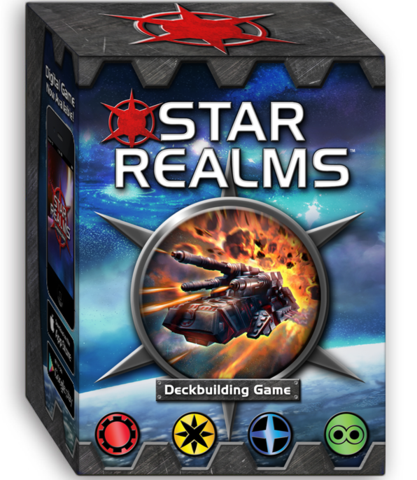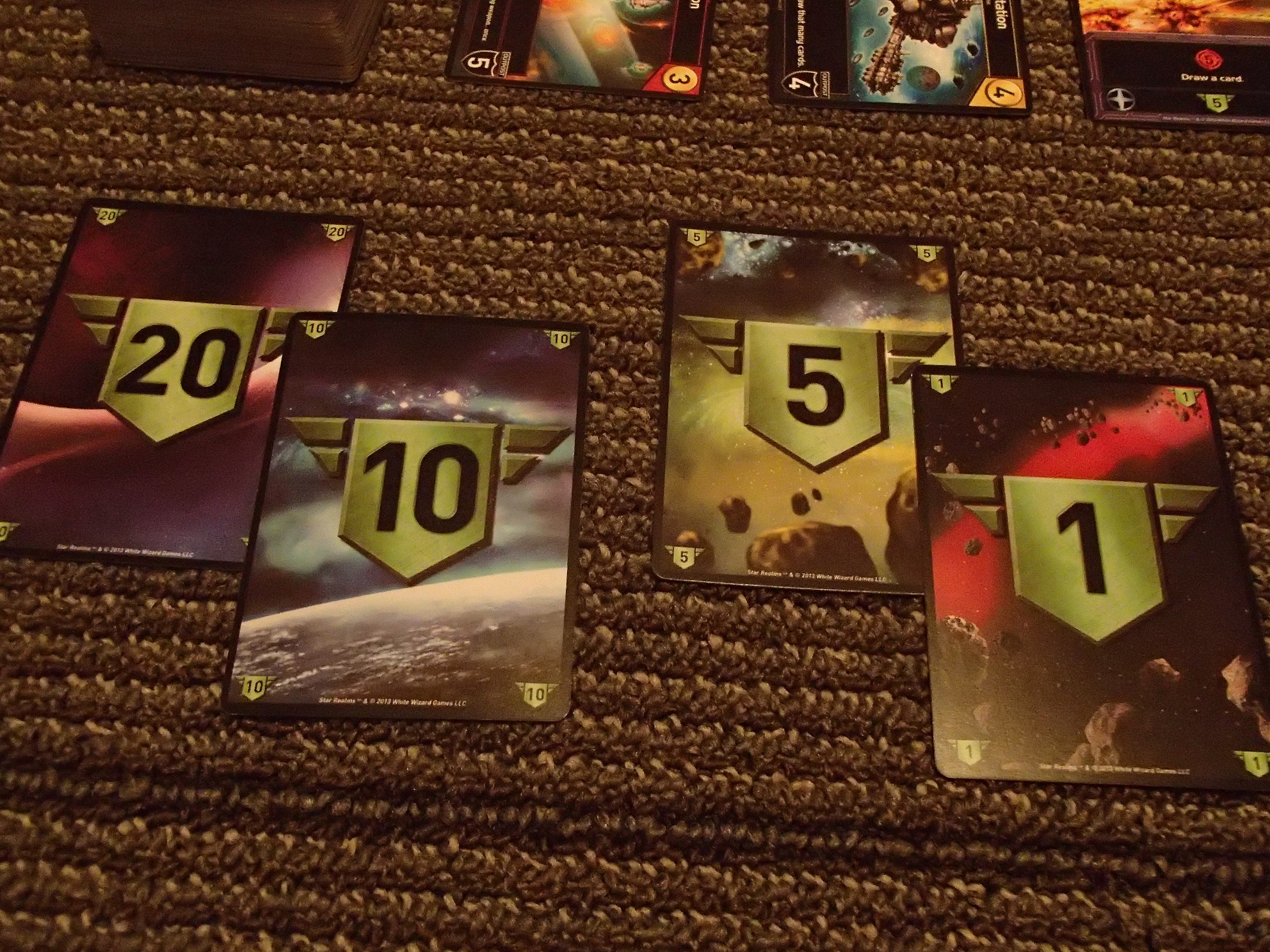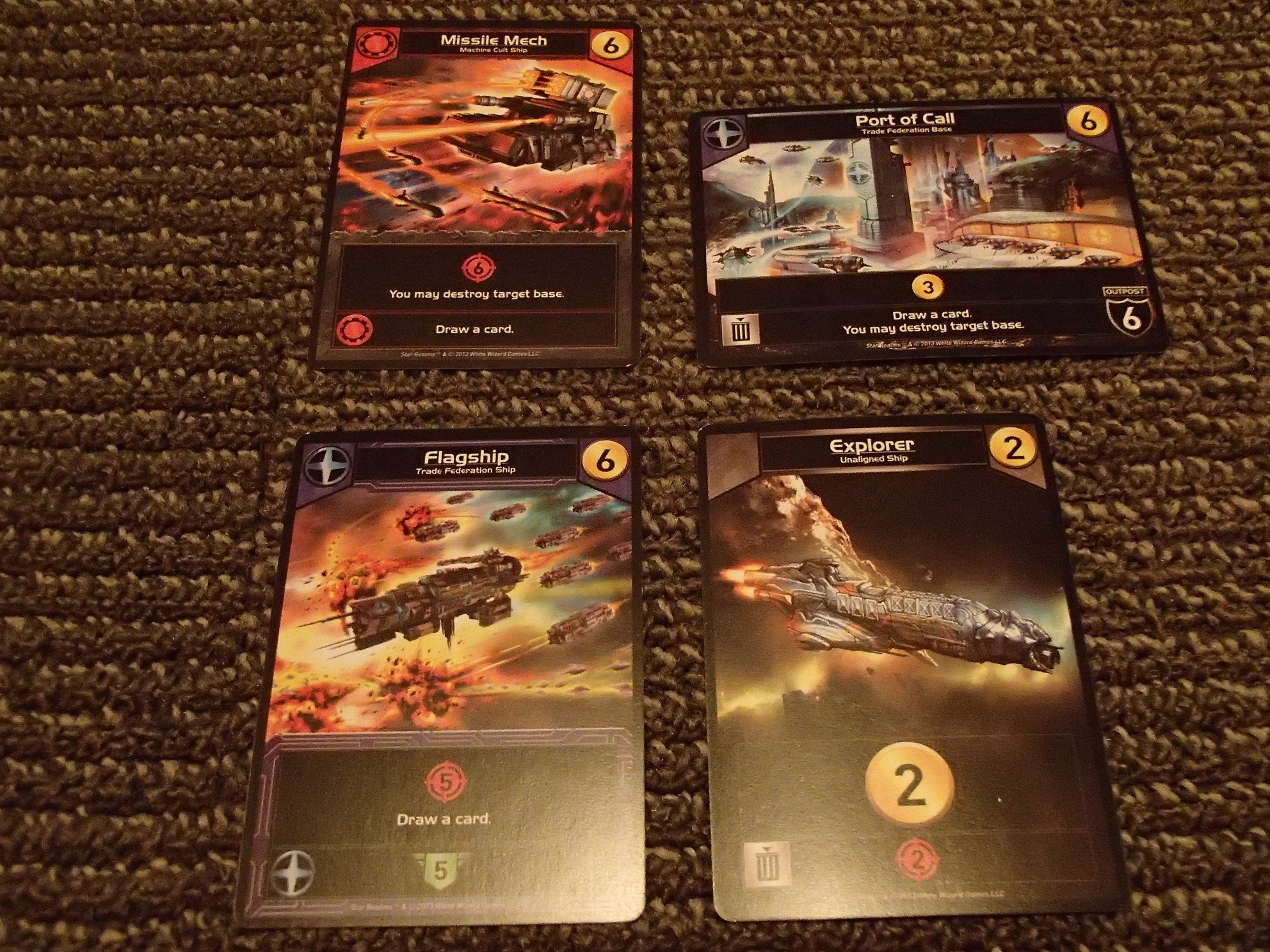| Publisher | White Wizard Games LLC |
| Design, Development Credits | Darwin Kastle, Robert Dougherty |
| Art, Graphic Credits | Vito Gesualdi, Graphics Manufacture, Gau Family Studio, Whale Shark Studios, Andre Martinez |
| Game Contents | 128 cards (80 Trade Deck, 18 double-sided Authority cards, two 10-card player start decks, 10 Explorer cards), two rulebooks (two- and multi-player rules) |
| Guidelines | Space fleet deck-builder |
| MSRP | $14.99 |
| Reviewer | Andy Vetromile |
In space, no one can get along. Witness the problems had by the four factions of Star Realms: They all want to be in charge and the constantly shifting alliances of the various craft in the game are keeping anyone from taking over the galaxy. Stupid factions.
The object is to reduce your opponent to zero Authority. Two players get identical decks and 50 points worth of Authority cards in this, White Wizard Games’ take on a deck-builder. They face each other across a vast stretch of space – well, that space that is their living room table, anyway – overlooking the Trade Row. This line of cards is up for purchase by either player; as one is bought, another takes its place from the deck so there are always five cards available. There is also a small deck of Explorers, slightly better Ships than what’s to be found in either player’s starting setup, cheap to purchase if one has a hard time scraping together the funds for the random (and much better) stuff in the Trade Row.
Cards come in two types, Ships and Bases. Ships provide their resources and then disappear at the end of the turn, while Bases stick around to provide Defense. The three “currencies” in the game are Trade, Combat, and Authority. Trade determines what Ships and Bases you can afford to buy, Combat is how much damage you do, and Authority keeps you in the game. As you play Ships you earn, spend, and amass these things. Trade is spent to select new cards for your deck from the Trade Row while Combat does points of damage to one’s Authority. Some Ships provide more Authority, however, making it harder to punch someone’s ticket. Bases hang in space providing their benefits, and some are labeled Outposts. Not only do Outposts absorb damage like other Bases, they must be attacked before any damage can be applied to their owner. Damage doesn’t accumulate between turns so its Defense must be overcome all at once.
The four factions are usually at each other’s throats, but the players can hire whomever they please to be in their deck. If they can field two or more cards (Bases or Ships) of the same faction in one turn, those craft all Ally, working together to unlock additional abilities. For example, a Missile Bot provides two Combat and the Supply Bot gives two Trade – but since they’re both Ships from the Machine Cult faction they provide two additional Combat each when they come up in the same turn. When one player finally takes out the last of his opponent’s Authority, he eliminates them and wins.
The game is a well-done graphic success. Ships and Bases both are professionally illustrated, and while few vessels really stand out without a lot of repeated play – they’re not as recognizable as, say, X-wings or the Enterprise – they’re pretty consistent within each faction. Machine Cult craft look like bristling armories, Blobs are almost organic in appearance, and so on. Few cards look crowded or busy, and the printed abilities are clean and easy to read with one exception: It’s far too easy to confuse the Combat symbol with the one used to mark the Machine Cult faction. Overall, one other dark spot is that the cards appear susceptible to bowing slightly in sunlight. It doesn’t make them unplayable, but they soon “click” like a tamper-resistant pop-up cap on a jar of preserves.
Smaller sets like Star Realms continue to prove a deck-builder need not be a $40 box of 200+ cards to be a deep and engaging experience. Only the Ally function really separates the mechanics here from other deck-builders but that’s all that’s needed to completely change the face of the game. It demands real strategy decisions about your purchases from the outset, and requires a small memory component since your opposition should be mindful which factions you concentrate on obtaining. The combos can be powerful and even less potent matches allow additional card draws, so the shopping list grows pretty quickly as you seek to establish an engine that permits easy and dependable manipulation of your deck.
Even cards in hand demand choices. Unlike other deck-builders, Star Realms welcomes permanent destruction of many cards from the roster through Scrap Abilities, giving you cool options when eliminating them . . . but it’s an expensive way to run what needs to be a cost-effective railroad. You can damage an enemy further by, say, giving up a Barter World Base that usually offers additional Authority, but hopefully you got your money’s worth before round-filing it. Ally the cards and you don’t have to make the tough choices because you get the vibrant abilities without scrapping valuable resources, and oh, is drawing the right two (or three) cards together both difficult and terribly satisfying. Two more players can join with a second copy or the addition of the alternate Colony Wars set.
White Wizard Games turns small things into a strategy-rich outing, playing fast and ending just when you think you have the arrangement you need to take the win. Making the most of the “building” half of the deck-building formula is critical and fun, so no turn is unimportant; there’s little room for error; and games often come down to one turn’s difference. Star Realms paints on a big canvas with a small but deft brush and makes a meal out of only the tastiest bits of its core mechanic.



